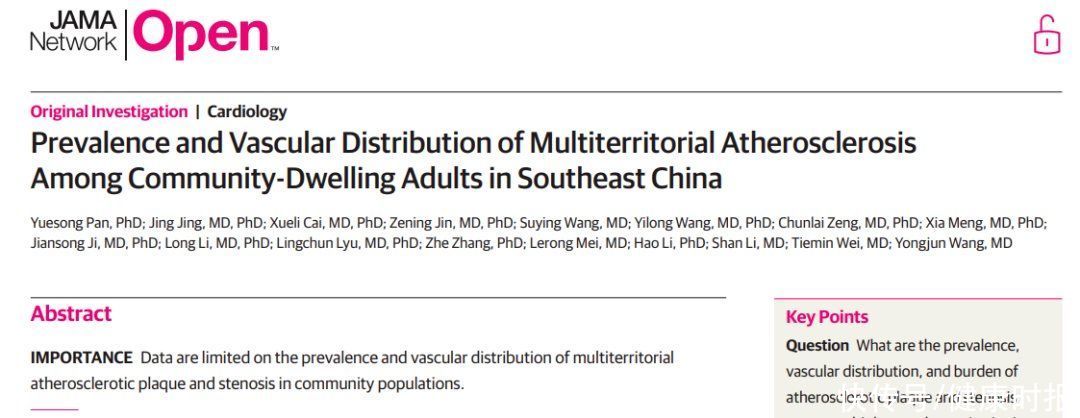Many people will find “arterial plaque” and “vascular plaque” during physical examination, and once the “plaque” falls off, it has a high probability of causing the risk of “embolism”.
Blood vessels spread all over the human body, and most of the arterial blood vessels in the body may form plaques. Where is plaque easy to grow?
Vascular plaques are most likely to grow in these places
In July 2022, Beijing Tiantan Hospital and the National Clinical Research Center for Neurological Diseases published an online article titled “Multiple Atherosclerosis in Community Residents in Southeast China” in the Journal of the American Medical Association. Prevalence and Vascular Distribution of 3067 middle-aged and elderly people in Lishui City, Zhejiang Province, and their cerebral vascular wall magnetic resonance imaging and tomographic angiography data were collected. ①

This study found:
< strong>1. Atherosclerotic plaques are prevalent in middle-aged and elderly people
The study found that atherosclerotic plaques are prevalent in middle-aged and elderly people in my country, and More than one place; about 40% of adults have an arterial stenosis of 50% or more.
2. Blood vessel “plaques” are most likely to grow in these places
The researchers assessed the extent of atherosclerosis based on the presence of involvement in eight vascular sites (intracranial, extracranial, coronary, subclavian, aortic, renal, iliofemoral, and peripheral), The presence of 2 or more involved sites was defined as multivascular atherosclerotic lesions.
The results showed that 2870 subjects (93.6%) had atherosclerotic plaques in at least one vascular area, mainly found in: ①
Aorta (79.6%)
iliac artery (75.8%)
p>subclavian artery (49.8%)
coronary artery (44.9%)
extracranial artery (36.4%)
renal artery (28.7%)< p>
Intracranial artery (17.7%)

Photo by Cao Zihao of Health Times
It is most dangerous to grow in these two places
Jiang Zhengming, Deputy Chief Physician of the Department of Cardiovascular Medicine, The First Affiliated Hospital of Zhengzhou University, in April 2022, published an article on Baijia.com that blood vessels are all over the human body, and most of the arteries in the body may form plaques , but the most life-threatening arterial vessels are cardiovascular and cerebrovascular.
1. Dangerous place 1: growing in the cardiovascular
If the plaque is in the cardiovascular In this case, the stenosis or blockage of the cardiovascular system may result in insufficient blood flow to the cardiovascular system, resulting in myocardial ischemia and hypoxia. When myocardial ischemia and hypoxia occur, symptoms of chest tightness and chest pain are prone to occur. In severe cases, it will cause acute myocardial infarction or acute arrhythmia. If treatment is not timely, it is very likely to be life-threatening.
2. Dangerous place 2: growing in the cerebral blood vessels
Plaques in the brain In the blood vessels, it is easy to cause cerebral vascular stenosis or blockage, resulting in cerebral ischemia and hypoxia. In less severe cases, dizziness, vertigo, tinnitus, and memory loss may occur. If the cerebral vascular stenosis is severe, it may induce cerebral infarction, fainting, etc., which is life-threatening.
If this condition occurs in the blood vessels of the limbs of the body, if the condition is not serious, the limbs may experience numbness, chills and other symptoms. If the vascular blockage is serious, it is easy to cause ischemic necrosis of the extremities. ②
These bad habits accelerate blood vessel blockage!
1. Chronic stress
< span>Nowadays, young and middle-aged people are too busy and have been in high-pressure and stressful work for a long time. Huang Jinyu, chief physician of the Department of Cardiology of the First People’s Hospital of Hangzhou, Zhejiang Province, said in an interview with Health Times in 2016 that high-pressure and high-intensity work, and often staying up late , the body’s biological clock may be disrupted, the sympathetic nerves are in a state of excitement for a long time, resulting in excessive secretion of epinephrine and norepinephrine in the body, which in turn leads to vasoconstriction, blood pressure and blood sugar rise, and accelerates the process of atherosclerosis . ③
2. Staying up late for a long time
February 2019 “Nature A study in the journal found that sleep deprivation increases inflammatory cells, the main cause of atherosclerosis. They did experiments with mice and found that compared with other mice, the sleep-deprived mice had progressively larger arterial plaques and levels of certain inflammatory cells, such as monocytes and neutrophils, in the blood vessels. Twice the of normal mice. ④
3. Long-term smoking
People who smoke regularly, smoke Causes damage to the blood vessel wall, gives a breeding ground for cholesterol deposition, and accelerates the production of plaque . ⑤
4. Prolonged sedentary
Director of Orthopedics, Beijing Ditan Hospital Physician Zhang Qiang published an article in Health Times in 2017, saying that people who sit for a long time with little movement will slow down blood circulation, increase blood viscosity, and weaken myocardial contraction. Over time, arteriosclerosis, coronary heart disease, etc. will be accompanied. ⑥
5. Chronic disease, obesity
Patients with hypertension, People with diabetes or abnormal blood sugar, as well as people with obesity, are at high risk of atherosclerosis.at-risk groups.
Do 3 things right to shrink or fade plaque
Guo Yifang, Vice President of Hebei Provincial People’s Hospital and Director of the Department of Geriatric Cardiology, published an article on the WeChat official account of “Guo Yifang’s Frontiers” in June 2022: ⑦
First, in order to achieve plaque reduction or reversal, we must first change bad living habits, that is, control diet, improve diet structure, increase exercise, lose weight, quit smoking and limit alcohol , these measures are an effective way to prevent further plaque growth or increase.

Health Times Picture
Second, if If you have high blood pressure or diabetes, you should also actively and reasonably control your blood pressure and blood sugar. Hypertension and diabetes are both important factors leading to the formation of atherosclerotic plaques. Hypertensive patients should keep their blood pressure below 140/90 mmHg and, if well tolerated, can drop below 130/80 mmHg. Diabetics should control their blood sugar well under the guidance of a doctor.
Third, statin therapy should be used. Statins can inhibit cholesterol synthesis and lower blood cholesterol levels, thereby preventing plaque growth. The lower the cholesterol level in the blood, the less likely the plaque will grow. Plaques can shrink in some patients when cholesterol is low enough. However, not everyone who develops carotid plaque needs a statin. If the plaque is large enough to significantly narrow the carotid artery (blocking more than 50% of the blood vessel), statin therapy should be administered promptly. If the carotid artery has no significant stenosis or only mild stenosis, it is necessary to determine whether statin therapy is needed based on each individual’s specific circumstances, especially cholesterol levels, under the guidance of a doctor. It is not right to self-medicate without medical advice. ⑦
This article is synthesized from:
①Yuesong Pan, Jing Jing, Xueli Cai, Zening Jin, Suying Wang, Yilong Wang, Chunlai Zeng, Xia Meng, Jiansong Ji, Long Li, Lingchun Lyu, Zhe Zhang, Lerong Mei, Hao Li, Shan Li, Tiemin Wei, Yongjun Wang. Prevalence and Vascular Distribution of Multiterritorial Atherosclerosis Among Community-Dwelling Adults in Southeast China. JAMA Netw Open. 2022 Jun 1;5(6): e2218307.
②2022-04-11 Baijiahao “Cardiology Ginger” “Professor Zhengming” “How is the “plaque” in the blood vessels produced? Is it dangerous? How should it be treated? 》
③2016-10-11 Health Times “Myocardial infarction has the root of “porridge”
④Nature: Sleep modulates haematopoiesis and protects against atherosclerosis
⑤2021-08-10 Health Times “Who are the high-risk groups for vascular plaque? 》⑥2017-02-14 Health Times “Where are the injuries from prolonged sitting”
⑦2022-06-15 WeChat public account “Guo Yifang’s frontier” “Carotid plaque Can it shrink or fade? possible! “(Guo Yifang)
Editor: Lu Yang
Reviewer: Yang Xiaoming